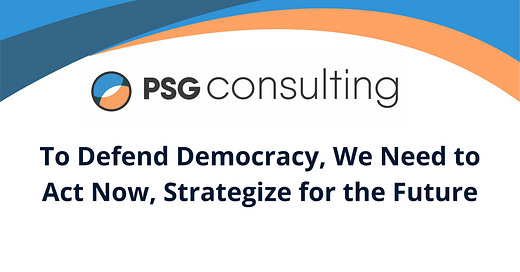To Defend Democracy, We Need to Act Now, Strategize for the Future
Some argue Democrats should “play possum” — adopting a rope-a-dope strategy in response to Donald Trump and Elon Musk’s ongoing assaults — by letting Republicans inflict harm on working families, wreck the economy and dismantle the social safety net. The thinking goes: if MAGA Republicans have free rein, Trump’s popularity will eventually collapse, and voters will come running to Democrats for rescue.
This strategy is a non-starter — both politically and morally. For millions of Americans, public services like Medicaid and Social Security are a matter of life and death. If Democrats sit on their hands while these programs are gutted, voters will remember our absence when they needed us most.
That said, engaging Trump directly on his preferred battleground — particularly on cultural issues where many Americans align with him — can be counterproductive. Similarly, on matters like the debt ceiling, Democrats should allow Republicans to suffer the consequences of their own fiscal irresponsibility and casual cruelty. But elsewhere, Democrats must be proactive, strategic and relentless.
A Three-Pronged Strategy for Democrats
1) Own the Narrative — Define the Debate Early
Democrats must set the terms of the budget debate before Republicans do. That means aggressively calling out their attempts to slash Social Security, Medicare, Medicaid and veterans' benefits while handing tax breaks to billionaires. It’s not enough to react — we need to drive the conversation. That requires a sustained, coordinated messaging strategy across earned and paid media to make sure voters understand exactly who is on their side.
2) Connect Policy to Real Lives
Most Americans aren’t following the ins and outs of congressional budget fights. They don’t need a policy memo — they need to know what’s at stake for their families, their jobs and their futures. Democrats must make these consequences tangible: job losses from federal cuts, seniors struggling without healthcare, parents unable to afford basic needs. The GOP is banking on voters not making the connection between their actions in Washington and rising hardship at home. We have to make that connection clear and inescapable from now until November 2026.
3) Counter the Deep-Seated Attitudes Fueling Trumpism
The battle isn’t just about policies — it’s about the underlying forces that enable Trumpism. Democrats have done well to force Republican lawmakers to defend their actions in their own districts. But we must go further. Trump’s movement thrives on distrust — 72% of Americans believe that the government is mostly working to benefit itself and the elites, and 60% believe the government is “almost always wasteful and inefficient.” More alarmingly, over half of Trump supporters say they would welcome strongman rule.
That disillusionment is fertile ground for authoritarianism. The Right has spent decades building an ecosystem designed to undermine faith in democratic institutions while consolidating power. They’ve packed courts with partisan ideologues, rewritten election laws to disenfranchise voters and normalized extremist legal theories like “presidential immunity” and the “unitary executive.” Their goal is not just political dominance but the systematic dismantling of multiracial democracy itself.
One of the biggest challenges we face is that Republican donors and strategists think in decades, while too many Democrats focus on two-year election cycles. The Right invests in media, legal frameworks and cultural influence that steadily shift public opinion and institutional power. We need to do the same. Democrats must adopt a “both/and” approach — winning elections while also building sustainable programs that shift public sentiment over decades.
For example, the Right has mastered the politics of “othering” — portraying certain Americans as dangerous outsiders to justify extreme policies. While progressives engage in reasoned debates based on fact, the authoritarian Right is winning on the battlefield of emotion. If we want to counter this, we must understand the emotional drivers of voter behavior — not just through polls and focus groups but by tapping into deeper cultural, psychological and narrative forces.
As conservative strategist Andrew Breitbart famously said, “Politics is downstream from culture.” He was right. If we want to safeguard democracy, we need to understand and influence the cultural and technological currents shaping society. That means investing in storytelling, visuals and messaging that don’t just inform but resonate viscerally.
This is not just a fight for the next election — it’s a fight for the next generation. The forces driving authoritarianism in America won’t stop unless we stop them. And that requires Democrats to do more than resist — we must lead.
That’s why PSG Consulting and Innovating for the Public Good: R&D for Democracy (IFPG) created the First Mondays Webinar Series on The Art of Narratives. The series examines democracy not just as a system of governance but as a living story that must evolve given our current threats. By bringing together various subject-matter experts, we explore innovations that can create a blueprint for democracy’s story and our ability to meet 21st century challenges and opportunities.
Catch up on the webinar series here: https://www.psgconsulting.com/first-mondays-series-2025.




